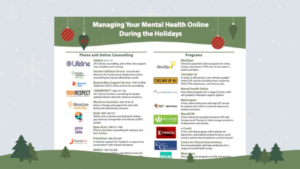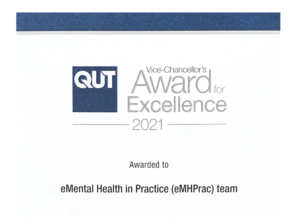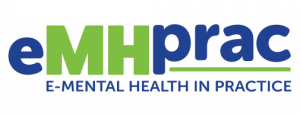Sign up below to receive monthly eMHPrac newsletters and updates about the latest digital mental health news, events, and resources.

Recent research by the Australian Psychological Society has revealed that one in five Australian psychologists has closed their books to new clients under the stress of the global pandemic, compared to one in one hundred prior to the pandemic. While policy makers, government officials and experts grapple with how to best respond to the strained mental health workforce, the upcoming holiday season is expected to place further stress on the system.
In this edition, eMHPrac highlights ways that digital mental health interventions can assist practitioners with alternate low intensity referral options, waitlist referral options, and digital services to assist your clients during clinic closures over the holiday season. Additionally, this edition focuses on online resources to assist mental health professionals in supporting clients through the challenges of the holiday season. We reflect on 2021 and as a result, the importance of the welfare of mental health professionals.
In this edition:
- Managing Your Mental Health Online During the Holidays
- *New* This Way Up – Supporting You Through Self-Isolation Email Program
- eMHPrac QUT Vice-Chancellor’s Award for Excellence 2021
- Head to Health Evaluation Survey – Seeking Participants
- See the eMHPrac team at these upcoming conferences
- Read the latest sMH research articles
- This month’s featured service: Counselling Online
- eMHPrac 2021 Year in Review
- Wishing You a Safe and Happy Festive Season
Managing Your Mental Health Online During the Holidays

While the research evidence on seasonal changes in the mental health of the general population is mixed, there is no doubt that the festive season can be a difficult time for people suffering from a mental illness. Financial hardship, increased stress and parenting demands, family conflict, loneliness and increased consumption of alcohol might impact on mental health outcomes. For people suffering from an eating disorder or alcohol use disorder, family and work gatherings centred around food and alcohol can create increased anxiety and distress.
Furthermore, the reduced availability of mental health professionals in the community over Christmas means that the holiday season can be a worrying time for practitioners and their clients alike.
Digital mental health services can be integrated with face-to-face mental health treatment in numerous ways over the festive season. Digital programs can provide practitioners with alternate low intensity referral options or waitlist referral options for new clients. Apps, phone services and online programs can be used prior to breaks to engage clients in safety planning or to build coping skills for periods without therapist contact. In-the-moment coping tools or crisis services can support clients’ mental health during a break. Time-limited therapist-support or self-guided online programs can be useful for skill building during periods of leave or after discharge from therapy.
eMHPrac has developed a Managing Your Mental Health Online During the Holidays factsheet which can be utilized as a prescription or handout for clients or kept as a guide to determine appropriate digital tools for clients to use over the holiday period.
*New* THIS WAY UP – Support You Through Self-Isolation Email Program

THIS WAY UP have developed a new, free, email-based program designed to support people with their mental health through self-isolation due to COVID-19.
The program involved receiving periodic emails through each stage of self-isolation that contain expert tips. The emails also direct consumers towards other existing This Way Up COVID-19 resources, including printable guides and plans, and video or audio tracks. While the program was designed for people beginning a 14-day self-isolation period, the program can be used by those isolating for brief or more prolonged periods.
Emails have topics such as ‘Managing in the Moment’, ‘Move Your Body’, ‘Proactive Skills’ for self-care, ‘Isolation Slump’ to deal with fatigue, boredom and anger, a ‘Good Sleep Guide’ and ‘Acknowledge Your Experience’, allowing consumers to cope with what comes next.
eMHPrac QUT Vice-Chancellor’s Award for Excellence


The eMHPrac team at QUT are honoured to receive a QUT Vice-Chancellor’s Award for Excellence for our work in providing training and support in digital mental health to health professionals. These awards celebrate the significant contributions of individual staff and teams. QUT leads the eMHPrac consortium in partnership with Black Dog Institute, Menzies School of Health Research, and the University Centre for Rural Heath (Northern Rivers). The award category was Partnerships and Engagement and acknowledged the strong collaboration occurring with partner organisations, digital mental health service providers, the Australian Government and a range of other key stakeholders.
The team were presented with the award at the 2021 QUT Recognition and Award Ceremony on Friday 10th December.
Read more about the QUT Vice-Chancellor’s Awards for Excellence and our fellow award winners at https://www.qut.edu.au/about/vice-chancellors-awards-for-excellence.
Head to Health Evaluation
Seeking Participants

Head to Health is seeking people to participate in a short online survey about their experience of the Head to Health website. The survey responses will help Head to Health better understand the benefits and concerns experienced while using the current website and identify ways the website might be improved. The survey evaluation is led by the Melbourne School of Population and Global Health, at the University of Melbourne and has been approved by the University’s Human Research Ethics Committee.
There are 2 surveys available, the first for consumers, family members and friends aged over 16 and a second for health professionals who provide or refer clients to mental health services. Each survey takes no more than 20 minutes to complete.
To complete the survey click the link below:

Catch us at these upcoming conferences

International Mental Health Conference
31 January – 2 February 2022, Gold Coast and Online
The International Mental Health Conference is designed for professionals, workers and volunteers to learn best practice, grow meaningful connections and implement real solutions to mental health care. Over three days of presentations, practical workshops, networking functions, live streaming opportunities and an interactive exhibitor hall, participants will be able to collaborate with international mental health leaders, gain practical tools and unite to advocate for equal mental health care for all individuals.
eMHPrac Director Heidi Sturk is among the International Mental Health Conference Program Committee this year, and is presenting on bridging the divide between practitioner and consumer use of digital mental health. You can also find the eMHPrac team at our virtual trade exhibit and pick up some of our resources.
To register for the conference or view the program, click the link below:
On our reading radar
Nadav J, Kaihlanen A, Kujala S, Laukka E, Hilama P, Koivisto J, Keskimäki I, Heponiemi T. How to Implement Digital Services in a Way That They Integrate Into Routine Work: Qualitative Interview Study Among Health and Social Care Professionals. J Med Internet Res 2021;23(12):e31668. URL: https://www.jmir.org/2021/12/e31668. DOI: 10.2196/31668
“Although the COVID-19 pandemic has significantly boosted the implementation of digital services worldwide, it was become increasingly important to understand how these solutions are integrated into professionals’ routine work. Professionals who are using the services are key influencers in the success of implementation. To ensure successful implementations, it is important to understand the multiprofessional perspective, especially because implementations are likely to increase even more.
The aim of this study is to examine health and social care professionals’ experiences of digital service implementation and to identify factors that support successful implementations and should be considered in the future to ensure that the services are integrated into professionals’ routine work.
A qualitative approach was used, in which 8 focus group interviews were conducted with 30 health and social care professionals from 4 different health centers in Finland. Data were analyzed using qualitative content analysis. The resulting categories were organized under the components of normalization process theory.
Our results suggested 14 practices that should be considered when implementing new digital services into routine work. To get professionals to understand and make sense of the new service, (1) the communication related to the implementation should be comprehensive and continuous and (2) the implementation process should be consistent. (3) A justification for the service being implemented should also be given. The best way to engage the professionals with the service is (4) to give them opportunities to influence and (5) to make sure that they have a positive attitude toward the service. To enact the new service into professionals’ routine work, it is important that (6) the organization take a supportive approach by providing support from several easy and efficient sources. The professionals should also have (7) enough time to become familiar with the service, and they should have (8) enough know-how about the service. The training should be (9) targeted individually according to skills and work tasks, and (10) it should be diverse. The impact of the implementation on the professionals’ work should be evaluated. The service (11) should be easy to use, and (12) usage monitoring should happen. An opportunity (13) to give feedback on the service should also be offered. Moreover, (14) the service should support professionals’ work tasks.
We introduce 14 practices for organizations and service providers on how to ensure sustainable implementation of new digital services and the smooth integration into routine work. It is important to pay more attention to comprehensive and continuing communication. Organizations should conduct a competence assessment before training in order to ensure proper alignment. Follow-ups to the implementation process should be performed to guarantee sustainability of the service. Our findings from a forerunner country of digitalization can be useful for countries that are beginning their service digitalization or further developing their digital services.”
McEvoy, P., Landwehr, E., Pearcy, C., & Campbell, B. (2021). A clinician’s guide to low intensity psychological interventions (LIPIs) for anxiety and depression. Western Australian Primary Health Alliance.
The Centre for Clinical Interventions (CCI) is a specialist clinical psychology service in Perth, WA. The CCI develop and provide evidence based psychological interventions, conduct clinical research, train health professionals to deliver evidence-based treatments, and provide free online resources to help people overcome mental health issues.
CCI has partnered with WAPHN to create A Clinician’s Guide to Low Intensity Psychological Interventions (LIPI) or Anxiety and Depression. “Low Intensity Psychological Interventions (LIPIs) can help to optimise a service’s ability to match treatments to clients’ needs, thereby efficiently and effectively providing the right care at the right time to the largest number of people. This manual provides clinicians with the information they need to implement LIPIs for adults with anxiety and depression.
Chapter 1 describes different types of LIPIs that services may wish to consider using with their clients, along with some guidance about how to match LIPIs to clients’ needs. Chapter 2 presents more detail about completing a LIPI assessment and case formulation, along with a case formulation template and case examples for several clinical problems. Chapter 3 illustrates how clinicians can use their case formulations to implement targeted psychological tools and techniques within a LIPI. Case examples, a treatment planning template, and an example treatment plan are provided. Finally, Chapter 4 provides guidance on designing group LIPIs, which may be helpful when clinicians receive regular referrals for similar problems. A template for planning and designing a group LIPI is provided, along with case examples.
In conjunction with appropriate supervision, this manual should provide clinicians with a range of skills needed to plan and implement LIPIs from a cognitive behavioural framework.”
CCI also has a suite of therapist manuals available, comprised of six therapist manuals available for purchase and five free to download from their website. The manuals are based on CBT principles and include courses aimed at symptom reduction, CBT formulation skills, and social skills training. The therapist manuals encompass both individual and group treatment programs.
This edition’s featured service…

Counselling Online
Free and confidential online chat (24/7), email support, online self-help modules, information, and moderated peer-support forums for alcohol and other drug users, their families and friends.
About Counselling Online
Counselling Online aims to improve community access to alcohol and drug treatment and referral services, particularly in rural and regional areas. The service offers online text-based counselling to alcohol and other drug users, and others affected by alcohol and drug use in the community, including family members, relatives and friends. Counselling Online also provides information, support and referral for drug users, family members and others. The site includes a self-help program, which aims to help individuals build on their existing motivation to change, set goals, identify what’s important, and help develop a plan to address aspects to their life that have been affected by their drinking or drug use.
Who is Counselling Online for?
Counselling Online is for people using alcohol and other drugs, their family members and friends.
Is there a cost to use Counselling Online?
There is no cost to access Counselling Online.
How to access Counselling Online
Anyone across Australia can contact Counselling Online at https://www.counsellingonline.org.au/ for information and to register for the self-help modules. The text-based counselling service is available at https://www.counsellingonline.org.au/find-support/chat-to-a-counsellor, where users can choose to be anonymous or register in order to allow counsellors to access information from previous sessions and offer continuity in counselling. For 24/7 telephone support call Counselling Online at:
ACT: 02 6207 9977
NSW: 1800 422 499 (regional) or 02 9361 8000 (metropolitan)
NT: 1800 131 350
QLD: 1800 177 833 (regional) or 07 3837 5989 (metropolitan)
SA: 1300 131 340
TAS: 1800 811 994
VIC: 1800 888 236
WA: 1800 198 024 (regional) or 08 9442 5000 (metropolitan)
eMHPrac 2021 Year in Review

During 2021, eMHPrac participated in 17 national conferences with over 16,000 delegates, through presentations and trade booths. We presented 49 tailored training presentations, webinars, and workshops to a wide range of health practitioners. Digital mental health options have been included in 250+ education workshops to over 4,000 GPs and health professionals. We released a new podcast series ‘Digital Mental Health Musings’, with 7 episodes available to date and an 8th in production to be released before the end of the year.
The eMHPrac resource library has continued to grow, with 31 factsheets available to download and 46 blogs to date available to read at any time on a range of topics. We have distributed over 15,000 hard copy resources to professionals Australia wide, and there have been over 35,000 online downloads of our brochures, factsheets and popular Guide to Digital Mental Health Resources. The eMHPrac website received continued interest with 155K sessions and 304K page views throughout the year. Widespread promotion of the WellMob website, which houses over 200 online social and emotional wellbeing resources for Aboriginal and Torres Strait Islander people, continued this year, gaining interest with over 43,000 sessions and 130K page views. The Community of Practice gained 767 members in the past year, totalling 5,984.
Wishing You a Safe and Happy Festive Season
As this is our final newsletter of 2021, we reflect on a difficult year for those working on the mental healthcare frontline. It is well documented that mental health professionals have experienced increased levels of cumulative stress resulting in high rates of burnout.
eMHPrac would like to wish you a restorative, safe, enriching and happy festive season and encourage you to make some time to reflect on the importance of your own wellbeing.
Good self-care looks like a strong awareness of how you have been feeling, reflecting on your expectations of yourself or your practice, valuing the work that you have done for the year and asking for support from others when it is needed.
Take a look at these apps if you are looking to add to your self-care library over the holidays:
- Head Gear
- 30 day mental fitness challenge designed to aid wellbeing.
- Smiling Mind
- Website and app teaching mindfulness meditation.
- TEN: The Essential Health Network for Health Professionals
- Resources for health professionals experiencing mental health concerns.
We look forward to seeing you again, refreshed in 2022!







